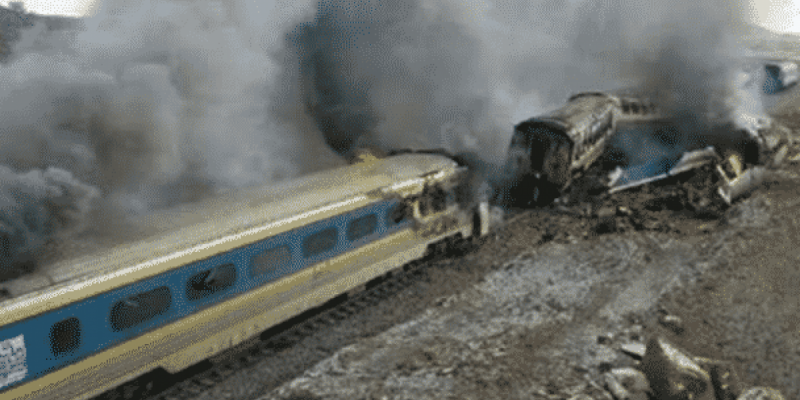Gunmen who attacked a train in northwest Nigeria and killed eight people have released a video of a bank executive who was among an unspecified number of passengers taken hostage during the assault.
The attack on the train between the capital Abuja and Kaduna city last week was a major escalation in violence blamed on armed criminal gangs, known locally as bandits.
Northwest and central Nigeria have long been terrorised by the gangs, who raid villages, killing residents and kidnapping for ransom.
But their attacks and abductions have intensified.
The video posted online shows Alwan Ali-Hassan, CEO of Nigeria’s Bank of Agriculture, flanked by four masked men in military uniform facing the camera, calling on authorities to meet his captors’ demands for the release of other hostages who “are in a dire situation.”
AFP could not independently verify the authenticity of the video, shot in a undisclosed forest with an armoured vehicle in the background.
But family members confirmed Ali-Hassan was released by the gunmen on Wednesday and that it was him in the video.
The men do not claim affiliation to any group, but the recording closely resembles propaganda videos by jihadist groups waging a more than 12-year insurrection in Nigeria’s northeast.
The opening prayer in Arabic by one of the men is the same as in all previous propaganda videos by jihadist groups. The positioning of the gunmen with the hostage is also similar.
Bandit gangs, who have no ideological or religious motives, have affiliated with jihadists in the past for pragmatic and financial reasons.
Kaduna has seen the presence of al-Qaeda-affiliated Ansaru jihadists, and elements of Boko Haram also operate in parts of the northwest.
In the video, the speaker said they decided to release the hostage out of compassion as a “Ramadan gesture,” referring to the Muslim holy month of fasting and to his “advanced age”.
Although the speaker claimed no ransom was paid for Ali-Hassan’s release, family sources said they had to pay money to the captors.
Survivors of the March 28 attack say gunmen opened fire on both sides of the railway carriages after blowing up the track and derailing the train.
Witnesses said gunmen broke into the VIP section of the train and herded out a number of passengers into the bush.
Condemning the attack, President Muhammadu Buhari acknowledged some people had been kidnapped from the train but did not give figures.
But one week after the attack, the Nigerian Railway Corporation said the whereabouts of 168 passengers were still unknown, although it is not clear how many may have not contacted officials.
The train attack was just one of a series of recent assaults in Kaduna.
Days earlier, gunmen also killed a perimeter security guard at Kaduna Airport and forced local airlines to
temporarily halve flights.
Gunmen also killed 11 soldiers in an attack on a small patrol base in Kaduna, according to two security sources. A community leader in the area confirmed army fatalities but gave no toll.
Bandit gangs may be motivated by financial gains, but there is concern among local authorities and analysts over alliances with Islamist militants even for pragmatic reasons.
In January 2019, Mansir Dan-Ali, then Nigeria’s defence minister who is from Zamfara state, said bandits terrorizing villages could have links with Boko Haram jihadists.
Boko Haram were also involved with bandits in central Niger state where it released videos showing bandits in the region pledging allegiance to the group’s late leader Abubakar Shekau.
The group was also involved with some bandits in Zamfara, including Awwalun Daudawa, a bandit leader who masterminded the December 2020 abduction of more than 300 schoolboys in Katsina.
Islamic State West Africa Province (ISWAP) is also know to have links with bandits in Zamfara, Niger and Kaduna states, including Dogo Gide, a bandit kingpin with vast a network of fighters.
In 2020 police said they killed more than 250 members of Ansaru, which split from Boko Haram in 2012, in the Birnin Gwari area of Kaduna state.








Comments